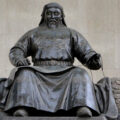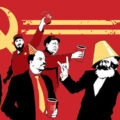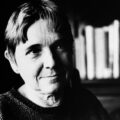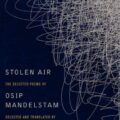The Moscow Calendar’s Going Islamic; or, The Soviet Empire in Brodsky’s Poetry

Hamid Ismailov is an Uzbek writer whose works are banned in Uzbekistan. He has lived in the United Kingdom since 1994. Several of his Russian-language novels have appeared in English to critical acclaim (notably The Railway, translated by Robert Chandler, as well as A Poet and Bin Laden and The Dead Lake, both translated by Andrew Bromfield). He has continued writing in exile, and worked for a while for the BBC’s Uzbek service in London. The past two years have seen the first English translations of his Uzbek-language work.
Ismailov’s writing continuously addresses themes of exile and identity, especially in terms of language. In his fiction, plots are interspersed with songs, poems, and fables reflecting the oral literary traditions of Central Asia; much of his writing refers explicitly to Sufi religious traditions and philosophy. He engages boldly with the tangled political web that has been woven in his home region over the past two centuries, as the place transitioned from rule by the khans of Bukhara to the Bolsheviks to Soviet power, followed by a remarkably ambiguous independence for the Central Asian states starting in 1991. Since then, Ismailov’s home country has been rocked by struggles between autocracy and democracy, modern economic growth and resurgent tradition, and ethnic and religious conflicts that had been forgotten, or at least repressed, for a generation.
This essay can be seen as an attempt to reconcile two of the literary traditions that are so important for Ismailov: the poetry (and politics) of Soviet Russia, and the much older poetic traditions of the Central Asian steppes.
—Shelley Fairweather-Vega, translator
Once I had a dream. I dreamed that Osip Mandelstam had just returned from his journey to Armenia, and he was telling me about it. Framed in the doorway behind him was the Moscow of the 1930s, soldiers marching, a feeling of alarm rising from the stomping of their boots.
“Do you know who I saw there, Hamid?” he asked me.
“Charents?” I guessed.
“Yes! Yeghishe Charents! And do you know what? He told me who the saddest poet in the world is. It turns out his name is Nadim.”
Here Mandelstam read some lines by this poet whom I had never heard of, and the unbelievable beauty of those lines woke me up.
That same day, I learned from a Turkologist friend of mine that as a matter of fact there actually was a great 18th-century Turkish poet called Nadim, from the Tulip Era, when Istanbul once again came together with Europe.
Then I spent a while wondering why a Jewish man, based on information from an Armenian man, had revealed to me, a Turkic man of letters, this poet Nadim from my own tradition, and why he had not found any better way to do it than to appeal to my subconscious, which had rearranged the M-N-D in Mandelstam to a perfect N-D-M for Nadim.
This introduction contains almost everything that I want to say about Brodsky, starting from the mysticism of the alphabet to which he was so devoted and ending with the mysticism of the name that he himself lived with. Brodsky was another Osya, or Iosef, or Joseph, who like the original Joseph of Genesis was tossed into a pit by his brethren, and just as Joseph did in Egypt, he finally won recognition outside of his native Canaan, outside his own land. This Joseph’s Zuleika, the biblical wife of Potiphar, must certainly be that demanding beauty, Venice.
The magic of this mythologema of names is so powerful that, strange and terrible as it may be, it is also plainly apparent in the fate of another Joseph: Stalin/Dzhugashvili. Now we can tie the first knot: Poetics and Politics.
The Soviet Empire was, in large part, an Empire of the Word. Paradoxically, perhaps, it seemed that Marxism spoke about the precedence of the material over the ideal; however, Leninism quietly replaced Marxist political economy with a voluntaristic politics in which the idea of authority comes to dominate. The empire constructed on this foundation, of the dictatorship of the proletariat, became a thoroughly ideological system in which the suggestiveness of the propaganda was much more important than economic realities. That was why the system conferred such genuine significance on literature and the makers of literature. It is also the reason that writers were automatically placed at the forefront of the party’s attention, starting with Lenin’s friend Gorky and continuing straight through to Gorbachev’s friend Yevtushenko.
The seeds of Joseph Brodsky’s fate sprouted in this conflict-laden situation. In other words, Brodsky was possible only in the Soviet Empire, because it is absurd to try to imagine any twentieth-century English, French, or Italian poet being locked up for parasitism, or banished from the country for poetry that was essentially apolitical and private. In that sense, if the Soviet Empire had not existed, then for Brodsky to exist, to paraphrase Voltaire, the Empire would have had to be invented.
Still, Brodsky’s relationship with the Empire was significantly more complex and multifaceted than dictated by the iconic Russian formula of the Poet and Power. In Brodsky’s case, this meant using the word to overcome the word. It was the overriding of communal words, catchphrases which had been depreciated and prostituted, by words that were personal, metabolic, and cryptic. Brodsky’s individual style seemed externally to accept the imperial, totalitarian format, and his verse is quite traditional in form, but he bursts it open from the inside. The thought is arranged inside this strict form in a way well suited to the thought itself: it stretches over three and a half lines if it wants to, and breaks off in the most unusual place; if it wants to, it only lasts till an interjection. This is not artificial enjambment, but rather the free flow of thoughts inside a format dictated from without.
Nobody in Russian poetry ever rhymed so many tiny bits of speech so frequently and so happily: purely functional words, prepositions, interjections, conjunctions. In this is the typically Brodsky-esque philosophy of partiality, but on the other hand, it is also something like a tangled ribbon of DNA, spun into a spiral and joining the parts of that spiral into the quaternary structure of a protein, which takes on the characteristics of life only in the presence of that sort of complexity.
Brodsky became a “part of speech,” a part of Russian speech, or Russian Soviet speech, and in this sense this most-Russian Soviet speech exerted a constant influence on Brodsky by its very existence. Yes, Moscow’s calendar was “going Islamic,” but in fact the entire atmosphere surrounding Russian speech was shot through with the steppes, with Asia. The whole Russian mentality has the steppe as its source. From there comes Russian despondency and restlessness, to say nothing of the nomadic tendencies of the Russian soul; from there comes Pasternak’s idea that living life is not just crossing a field, and the journey is a long one. As Brodsky himself wrote:
I recognize this wind battering the limp grass
that submits to it as they did to the Tartar mass.
I recognize this leaf splayed in the roadside mud
like a prince empurpled in his own blood.
Fanning wet arrows that blow aslant
the cheek of a wooden hut in another land,
autumn tells, like geese by their flying call,
a tear by its face. And as I roll
my eyes to the ceiling, I chant herein
not the lay of that eager man’s campaign,
but utter your Kazakh name which till now was stored
in my throat as a password into the Horde.
All of Soviet existence was one gigantic cauldron full of very different cultures. The philosopher Socrat Sharkiyev described the phenomenon this way:
Now I am picturing my own Soviet life. The kindergarten I attended in the mountain village in the Ferghana Valley. Our teacher Valentina, who was in love with her Armenian boyfriend, who played the bayan and sang about the “twinkling stars of Siberia.” The son of the local judge, the Kyrgyz boy Tulyan, nicknamed Tolyan, a regular Jinghis Khan, whose mirror I broke and who threatened to have his mother the judge sentence my mother to tie me to a mare’s tail. My rival for the affections of Lenochka Korobochkina, the Tatar Rinat, who brought her Tatar meat pies from his house; Lenochka hated my Uzbek samsas, but she did dance the hornpipe with me. The Greek, Ilyusha Pentakidi, who informed us Homerically that Lenochka was his, that he had made her a “stukalochka” just yesterday (what sort of Hellenic contrivance that was I still don’t know…) And etc. and etc. School? The army? Konigsberg. Somewhere there Kant was lying in rest, somewhere the Amber Room had been hidden away. Altukhov, from Riga, told us all about that; he knew everything having to do with occupation economics. And the quartermaster Danielius Shvyarus, who we called Primus, like a partisan in the woods, secretly rummaged through our pockets, full of contraband after the holidays, and handed over occupier after occupier to the secret-agent Chekist. Then there was the Nogay from Astrakhan, Badretdinov, engaged in his own brand of business. In exchange for the caviar from Astrakhan, sent to the city post office to be held until called for, he bought up the officers’ leather boots and sent those to his hometown, and with the profit he earned he bought sweet buns with raisins at the officers’ mess, because they reminded him of his mama’s biscuits. The Kazakh, Kanyshev, was dying from a suffocating asthma so far from the steppes. The Tajik Abdullo Nuriyev prayed in secret in the latrine. The Georgian pranced like he was on horseback, the Armenian lusted after Nyusha the cook. Soviet life flowed on… Go to the bazaar, sit in prison, lie down in a Soviet cemetery—it’s the same crazy variety everywhere… That’s me just saying whatever pops into my brain, off the top of my head, as the English would say, or off the cuff, as the Russians would put it. That’s how Soviet life was. An enormous cauldron of the civilizations, in which we all boiled together till we were well done, maybe overdone—the Buddhist with the Muslim, the atheist with the homosexual, the nationalist with the communist, the mythological with the ideological—there was just no end to who was cooked with what, and in what combinations.
Therefore it is completely unsurprising that a single look at Brodsky’s work reveals extremely rare images that suddenly pop to the surface in places nobody would ever search for them. His “Great Elegy to John Donne” begins this way:
When John Donne dropped to sleep all around him slept.
Pictures were drowsy on the wall, the floor
was deep in rugs and tables; furniture
whose certain essence was a sleep that kept
the clocks as motionless as lumber.
At rest in cupboards as in dormitories
the linen slept as though it were bodies
draped in animal slumber […]
The sea is asleep, too, as are the angles and the prophets, the saints and the devils. Later in the poem Brodsky goes on, and uses a rarely encountered figure of speech:
Man’s coat is tattered. And it may be torn
by all who want to tear it more. It frays and is redeemed to soar
briefly, the wearer’s shroud. Once more it’s worn.
Sleep soundly, Donne, and let your soul not mope…
It’s important to note that at approximately the same time, an Uzbek poet of approximately the same age, Abdulla Oripov, wrote approximately the same poem, in which a whole list of everything in the world, except for human jealousy, is asleep (it could be that Soviet stagnation was finding a reflection in the poetical consciousness). On top of that, in Chulpon, another Uzbek poet from early that century, we find these lines with the same surprising imagery:
If the cloth of the world has torn (tattered!), that is nothing to despair of,
one day a cotton wad of snow will drift over the earth…
Another time the echoes between Brodsky and Chulpon (who was executed in Stalin’s dungeons in 1938) take on a nearly mystical shade. Here is Brodsky:
Someday the slowly rising breakers but,
alas, not we, will sweep across this railing,
crest overhead, crush helpless screams, and roll in
to find the spot where you drank wine, took cat-
naps, spreading to the sun your wet
thin blouse—to batter benches, splinter boardwalks,
and build for future mollusks
a silted bed.
And here is Chulpon, with the ending of his poem “Fiery Water”:
The sea foams, it surges, it floods,
Gushing noisily over your grave…
These are only echoes, which, of course, can also be found in other poems. But I only want to use one example to discuss whether the accidental or non-accidental echoes are more common.
Kazakh oral poetry, perhaps more than any other tradition, has preserved the features it took from the steppes and from nomad life. And that is our subject.
The Kazakhs still have fox hunting. Riders on horseback chase a fox across the steppe in a particular direction. When the fox has been chased long enough that way, the riders deftly sweep around it to one side and abruptly change the direction of the pursuit. That moment is called the kaytarys, which can be translated as something like “breakpoint.” Now the fox is running to one side. When it has been chased out in that direction, the riders again go alongside it and again abruptly change the direction of the pursuit. After the second or third kaytarys an important change occurs: the riders head for the fox not from one side, but from straight ahead. This is the uluu kaytarys, the “great breakpoint.” The fox falls down dead. This uninhibited creature of the steppes, clever though it may be, is simply incapable of imagining that the steppe, so wide open in every direction, has now been closed off.
The aesthetics of the jir, traditional Kazakh poetry, are something like that. A theme is declared. As the mind gets accustomed to how the subject is developing, the poet/storyteller abruptly changes course with his thoughts. Things continue to be strung together in that fashion, and after two or three breakpoints the poem is finally snapped in two by the uluu kaytarys, most often in an unexpected antithesis. So that you don’t have to take my word for it, here are a few examples from Bazarbay, a Kazakh jirau, or bard, of the 18th century.
Каргадан карга туар каркылдаган
Жаксыдан жаксы туар жаркылдаган…(A crow [карга] gives birth to a cawing crow [карга],
Good gives birth to the good, to the brilliant…)
This thesis begins the poem. Then the thesis is developed, and what is born from it is the key to this theme. Then the theme changes slightly, or, more precisely, it gets replaced, as another aspect of generativity is added: the historical aspect, discussing what was true in the past, and what is true now. Our thinking adapts relatively quickly to the isomorphic development of this theme, and at that moment there is a new change in perspective, to the aesthetic: how the goodness drops out of people because evil gives birth to evil, etc. The poet could load this part with a progression of proverbs or who knows what else; the important thing is to lull the listener’s conscious mind off to sleep as it tunes in to this wavelength. Then suddenly the end of the poem arrives:
Алардын арасинде бизде журмиз
Топракда зартуймедек жаркылдаган.(Among them [this people] we too walk/live
Like a golden button in the dust…)
Remember the beginning of the poem, how good is born of the good, of the brilliant? Now this button, which ought to be sewn onto a royal cloak, is flashing in the dust, piercing the entire poem, start to finish, with an unusual light, from which the clever conscious mind is no longer capable of fleeing; it falls down dead before the poet. The beginning and the end of the poem, in a way, are reflected in each other, and this tension between two poles suddenly lights up the whole poem.
Here is another example, again from Bazarbay.
Айдында айдан башка ай жок…
(In mooniness there is no moon aside from the moon…)
There follows a progression of what else does not exist in the world, with all these breaking-offs and bends in the thought, until finally everything is resolved in the last line:
…дунянын барлыгы мал бок.
(…the whole world is a cow patty.)
And this cow patty, lying there as an earthly, round reflection of the moon in heaven, upends the entire poem, and the entire person ends up somewhere between the moon and the crap, combining within his consciousness those two poles, between which churns the current of the verse, and of life.
Now we come to the technique of the “long-thinking” Brodsky, which is surprisingly similar to this Kazakh poetical aesthetic fox hunt. Here is the first example that comes to mind, the very first poem which was, for me, the beginning of the forbidden, typewritten Brodsky:
I arrive at Christmas without a kopeck.
The publisher’s dragging on with my epic.
The Moscow calendar’s going Islamic.
I’m not going anywhere.
Not to the bawling kids of my buddy,
the family bosom, or a certain lady-
friend I know. They all cost money.
I shake with ill will in my chair.
That is how his “Speech on Spilled Milk” begins. Brodsky goes on, developing the thesis of the lack of money, and says,
I could scrounge at the union branch—you try it
may as well scrounge from the local girls.
And he transitions to the topic of that sort of woman. But as soon as you get used to her, the thought jumps over to Marx and sociology.
Equality, pal, throws brotherhood off.
Better make sense of that. A slave
breeds nothing but another slave,
and no less after a revolution.
Capitalists breed communists,
who spawn in time careerists.
These finally hatch out morphists…
…and so on and so forth. Then he starts in on ethics.
But money’s close to godliness.
It’s not Heaven-sent—Allah attest
and is just as keen to be gone with a gust
of wind as, say, a promise is.
And then the poet focuses on himself, saying he’s not concerned with others’ bliss,
but to perfect the thing inside:
midnight, drink, the lyre… What else?
The trees are dearer than the wood.
I share no interest with the crowd.
Inner progress has a speed
much greater than the world itself.
Look how the thought is pursued, side to side, left to right: here you have racism and pacifism, philanthropy and culture and religion, till on the fortieth fateful turn, out of absolutely nowhere, this appears:
Sing dolderol, the green of May!
What does the hedgerow sigh to me?
To walk without a shirt is my
delight! Return, O green of May!
O, in her little scarf she’ll walk
across the fields, a flower she’ll pick.
I’d take her for my daughter! Look,
a little swallow in the sky.
Compare this, as we did with Bazarbay, with the beginning of the poem, and it’s suddenly very clear how much in contrast this feeling is to the initial one. A person shut up in hopelessness, tempted by the flesh, nailed to a chair and constrained to that space, and then, suddenly, the perfect selflessness of nature, a cast-away shirt—how good it would be to strip off even your very last garment, and take off like a bird in the sky, which will never reap nor sow, but only bathe in God’s mercy. And even the original prostitute, the holy Mary Magdalene, is transformed here into an innocent young daughter…
We could continue along these lines, pointing out many more of Brodsky’s epics or jiry, to help our minds come more to terms with this train of thought, make it our own, canonize it; but I dictated a nomadic form, and I would do well to follow it myself.
A while back, Aleksandr Solzhenitsyn dedicated an essay in his Writer’s Diary to Brodsky’s poetry, and like the Four Wolves and a Kid Goat game you can play with a set of checkers, he dismantled, brick by brick, his fellow Nobel laureate. First he tackled Brodsky’s “trifling” stay in the Gulag, then the “Russian” part of Brodsky’s poetry, and demonstrated that the poet did not know “the expansive possibilities of the Russian language.” Then he attacked him on international soil regarding the ill-fated Mary Stuart, and finally, he took even the European crown off of Brodsky’s head, saying that the poet had never raised his voice in defense of the Jews. I’m not mentioning this to defend the Jewish Brodsky against the ethnically Russian Solzhenitsyn. I’m mentioning it in an attempt to differentiate inherently metonymic prose, which tends from the start to totalitarianism, from poetry, which is metaphorical by nature, and, consequently, is replete with parts that equal other parts and words as important as any other words.
Solzhenitsyn judges Brodsky not according to the laws of Brodsky’s poetry (remember that Pushkin said a poet should be judged by his own laws), but by the laws of Solzhenitsyn’s prose. But after all, while Brodsky in his poetry is Soviet in form, Solzhenitsyn is Soviet in content (though with a minus sign). One is the very anti-embodiment of Soviet imperial prose, and the other is a poet who is possible, like a dream, only within this Empire. Yes, Solzhenitsyn is probably right about a lot of things, Solzhenitsyn-style, in his diary, but the strange thing is that even if not for the “universal resonance” Dostoyevsky was looking for, then at least in terms of “Eurasian” resonance, the Jewish Brodsky turns out to be more Russian than the Russian Solzhenitsyn, who built up his Russian nest all on his own.
And by the way, what am I, an Uzbek, doing here, judging this stuff? Maybe it’s the mysticism of letters again. B-R-D, the free-as-a-bird bard, Brodsky, versus Solzhenitsyn, S-L-Zh-N, bound forever to sluzhenie, service.
Poetry from Brodsky is quoted here either in Brodsky’s own translation, or in translations by George F. Kline and Glyn Maxwell.
Essay translator Shelley Fairweather-Vega is a professional Russian-to-English translator and an enthusiastic Uzbek-to-English translator living in Seattle, Washington. She loves solving puzzles (including those not related to translation) and is especially interested in examining the puzzling intersections between culture and politics. In 2016, Fairweather-Vega finished translations of two Uzbek novels by Hamid Ismailov: Gaya, Queen of Ants and Hay ibn Yakzan and the Language of the Bees.
About Hamid Ismailov
Hamid Ismailov is an Uzbek poet and novelist who has published dozens of volumes of poetry and fiction. Selected titles available in English include The Underground (Restless Books, 2015), A Poet and Bin Laden (Glagoslav, 2012), and The Railway (Random House, 2007).





